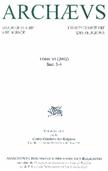
Eliade and Goethe
The purpose of this article is to establish to what extend the influence of Goethe’s morphology of plants on Eliade’s methodology in the history of religions is traceable and sustainable. In this respect, Ricketts makes use of as many as possible quotations from Eliade’s work, from the single article ever published by Eliade explicitely referring to Goethe, “Encheiris Naturae” (Cuvântul VIII, 1932, no. 2486) to the numerous autobiographical passages (in the Journal, Autobiography or the correspondence). An important, central, part of this article is devoted to the discussion of the possible major influence of Goethe’s Morphology of Plants on the construction itself of the Traité d’histoire des religions, question bought to light by Jonathan Z. Smith in an old article, “Adde Parvum Parvo Magnus Acervas Erit”, History of Religions 11 (1971), no. 1, reprinted in Map Is not Territory, Leiden, Brill, 1978. In response to this article, Ricketts gathers many, rather biographical, testimonies of Eliade concerning Goethe in order to sustain, as conclusion also, that Eliade “was unwilling to concede that his methodology was simply an «adaption» of Goethe’s because, in his mind, it was his own creation".
More...